Eclogue Definition: We explain what the eclogue is in literature, its origins, meaning and authors who cultivated it. In addition, examples of famous eclogues.
What is an eclogue?
In literature, an eclogue is a type of short lyrical composition, of the bucolic genre, with a strong musical presence but generally in dialogue or monologue, like a short one-act play. It deals with a theme that is almost always about love, inserted in an idealized vision of rustic and pastoral life, although it should not be confused with the pastoral literature of the European Middle Ages. You should get information about this (Dramatic genre)!
The origins of the eclogue date back to Greek antiquity, and its first exponent is considered to be Theocritus of Syracuse (c. 310 – c. 260 BC), one of the most important poets of Hellenism. In fact, the word “eclogue” itself is of Greek origin, coming from the word eklogé (translatable as “chosen”). Theocritus’ Idylls inspired the Roman Virgil (70-19 BC), who in turn composed ten eclogues of his own, entitled Bucolics.
The genre subsequently disappeared until it was rediscovered during the European Renaissance. It was revived by the Italian poets Dante Alighieri (1265-1321), Francesco Petrarca (1304-1374), Giovanni Bocaccio (1313-1375) and Battista Spagnoli (1448-1516).
In fact, Spagnoli’s Bucolics (better known as Mantuano) had an immense influence on later English literature, such as Edmund Spencer (1552-1599), Richard Lovelace (1618-1657) or Andrew Marvell (1621-1678). The latter’s work, in turn, was influential on the famous Jonathan Swift (1667-1745). In those times, however, the eclogue was already used for ironic purposes to address non-pastoral themes.
Other important exponents of the eclogue were the Spaniards Garcilaso de la Vega (1498-1536), Lope de Vega (1562-1635) or Pedro Soto de Rojas (1584-1658), among other authors prior to or belonging to the Spanish Golden Age. The verses by Garcilaso de la Vega that define the genre are famous, which are the following:
- The sweet lamentation of two shepherds,
- Salicio together and Nemoroso,
- I must tell, imitating their complaints;
- whose sheep in the sweet singing
- were very attentive, the loves,
- (forgotten of grazing) listening.
- (Eclogue I).
Nowadays, as expected, the eclogue is rarely or never practiced, and is considered part of the history of literature. Maybe you should look into this (Perspective graphic arts)!
Examples of eclogues
Some recognized eclogues are the following:
- The set of Bucolics by the Roman poet Virgil.
- “Soliloquy of Salicio” in the Eclogues I by Garcilaso de la Vega.
- “Eclogue to Claudius” by Lope de Vega.
- “Eclogue of the three shepherds” by Juan del Encina.
- “Eclogues” by Petrarch.
- “Eclogues” by Theocritus.
